Of all the daft notions about the classical music business, the daftest is that it’s
a business at all. Seriously: an industry that’s structured to make a loss, unable to survive without subsidy? If you enjoy conspiracy theories, classical music’s façade of white-tied affluence, combined with fading memories of Herbert von Karajan’s private jet, might imply the existence of some vast global musical-industrial complex. Perhaps it even existed, once. But the modern reality is a fragile network of (to quote Sir James MacMillan) cottage industries: ensembles, promoters, boutique record labels, all heads down in their silos, sweating away at whatever it takes for their own corner of this unsustainable ecosystem to break even.
For proof, think back to the 1990s, when Classic FM plugged a new recording of Gorecki’s Third Symphony and the impossible actually happened: a serious, large-scale work by a contemporary classical composer sold in platinum-disc quantities. At this point, conventional economics dictate that Gorecki’s symphony should have conquered the world’s concert halls. In reality, most concert planners probably never even clocked its success. Since 2009 the symphony has had a little more than 50 live performances worldwide (for comparison, Elgar’s First Symphony had nearly 100 performances in its first year). It’s not that classical music is hostile to change; it’s just completely unprepared to take advantage of it.
Something similar might be happening with the Polish composer Grazyna Bacewicz (1909–69). A cycle of her string quartets, recorded by the Silesian String Quartet, won the Chamber Music category in the 2017 Gramophone Awards. Reviews were uniformly enthusiastic and the box set climbed the album charts. But I’ve not spotted any really major uptick in live performances, and last week, when the Silesians came to London with a programme that included Bacewicz’s 1951-vintage Fourth Quartet, the Wigmore Hall looked less than two thirds full.
That’s a pity. Bacewicz is a genuinely rewarding composer, though not so much for her vibrant mid-century-modern orchestral music, which sounds to me exactly as worthwhile (and is pretty much just as neglected) as similar works by contemporaries such as Darius Milhaud, Roy Harris or Grace Williams. Her seven string quartets, composed between 1938 and 1965, are on another level. Like Shostakovich’s quartets, they’re a sort of secret diary, written under Nazi occupation and Soviet oppression. But Bacewicz’s inner world is a place of thrilling creative freedom: an art that acknowledges external tragedy without being consumed by it, and which treads a tightrope between the opposing dogmas of socialist realism and the western avant-garde with the assurance and panache of an acrobat.
True, that lightness wasn’t quite so much in evidence at the Wigmore. The Silesians’ vision of the Fourth has broadened and darkened since their recording. But what was undeniable was the music’s tactile warmth: lush singing lines, textures that you want to slosh over your palate and major chords sloping between overcast chromatic harmonies like evening sunlight breaking through thunderclouds. Bacewicz was a virtuoso violinist, and like Frank Bridge among the great 20th-century quartet composers — but unlike Tippett, Bartok or Shostakovich — she understood how to make string instruments bounce easily off each other, creating music that glows from within.
The Silesians proved that point by following Bacewicz with composers who didn’t know (Schumann) or didn’t care (Stravinsky) how to write for strings; performances whose fractured, stop-start emotional urgency was all the more potent for coming after Bacewicz’s sonic masterclass. And then, astonishingly, as an encore they played Penderecki’s entire Second String Quartet. Penderecki deploys every string-
snapping, knuckle-cracking gimmick available to a state-licensed Polish modernist in 1968, before inevitably (being Penderecki) outstaying his welcome. Photographs of Grazyna Bacewicz often show her tight-lipped, with a knowing smile, and by the end of this concert you could imagine why.
At the Buxton Festival, there was a brief residency and a full house for Jeff Clarke’s terrific buffo company Opera della Luna. Offenbach’s Orpheus in the Underworld is a rude, salacious satire disguised as a pastel-tinted pastorale, and Clarke’s on-the-nail update presents a candy-coloured Arcadia where Public Opinion is an Arts Council diversity wonk, outraged that Orpheus (Tristan Stocks) has no intention of calling out Pluto (Anthony Flaum) for his shamelessly #MeToo abduction of Daire Halpin’s pink-haired Eurydice. In hell, meanwhile, Pluto’s valet — addressed, suspiciously, as ‘Dave’ — sings dolefully of his former life as King of Chipping Norton.
That makes it sound too blunt. Let’s say that Remoaners and Brexiteers will come away equally offended, but not before sniggering like schoolkids at the Olympian gods’ teeny-tiny terry-towelling dangly bits, gasping at the physicality of the company’s dance troupe (the Infernal Galop looked positively dangerous) and humming along with the endlessly fresh and deliciously sung melodies that tumble, bubbling and crystal-clear, through some of the sublimest silliness you’ll see in a theatre this or any year.
I laughed like a drain.
Got something to add? Join the discussion and comment below.
Get 10 issues for just $10
Subscribe to The Spectator Australia today for the next 10 magazine issues, plus full online access, for just $10.
You might disagree with half of it, but you’ll enjoy reading all of it. Try your first month for free, then just $2 a week for the remainder of your first year.

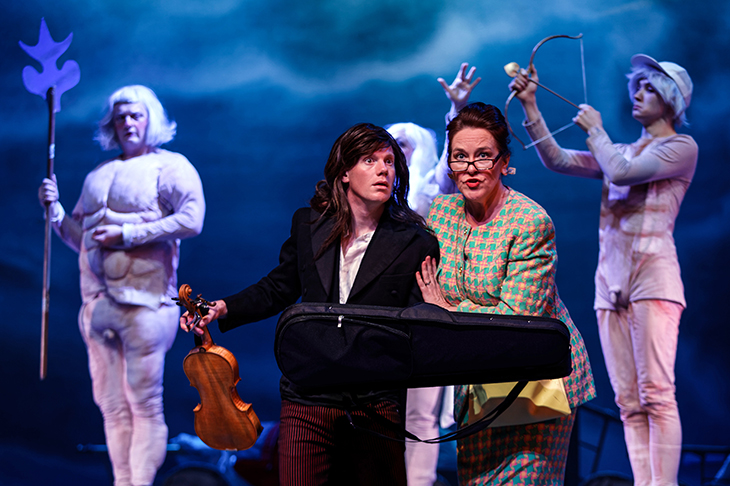
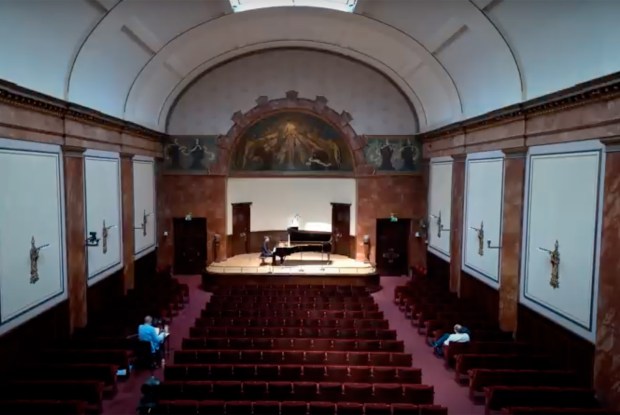
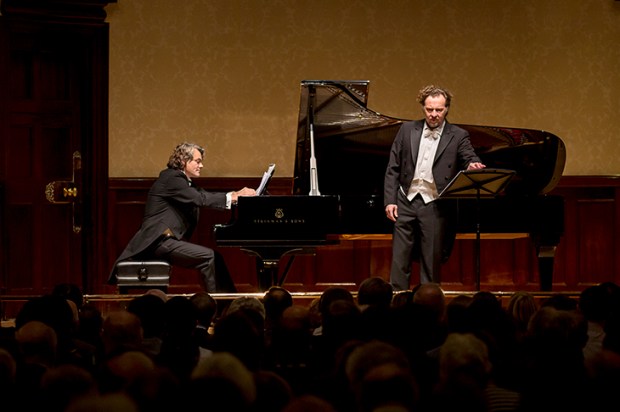

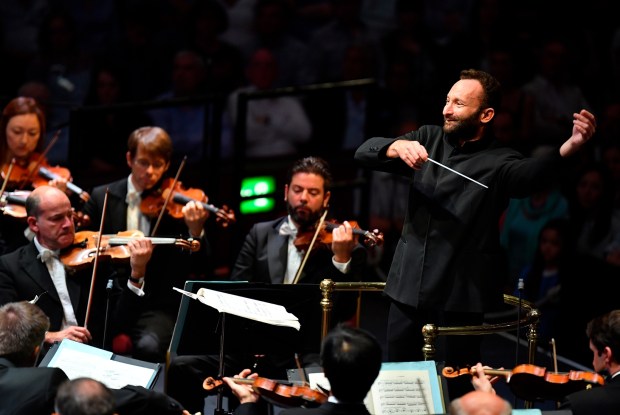
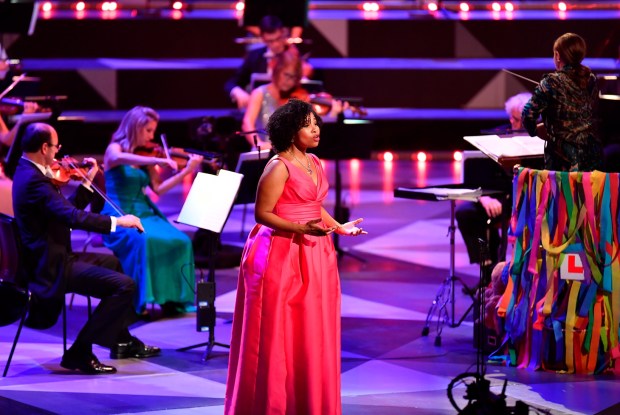
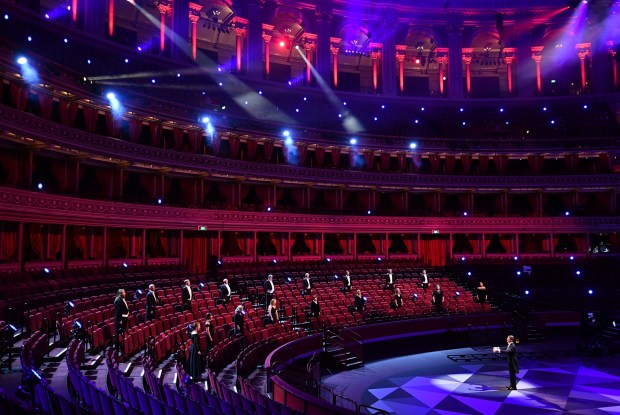






Comments
Don't miss out
Join the conversation with other Spectator Australia readers. Subscribe to leave a comment.
SUBSCRIBEAlready a subscriber? Log in